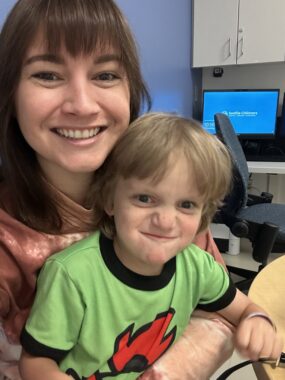Learning to worry a little less as we stick to our son’s care plan
As parents, it's normal to be concerned, but we're on the right track
Written by |

During my time writing columns for Liver Disease News, I’ve often shared about themes like worry, stress, and anxiety. These are common feelings when you’re raising a child with a rare genetic disorder. They come from wanting nothing more than for a child to lead a fulfilling, healthy, and beneficial life.
Raising a child with a rare disease entails so many unknowns. But occasionally, we get to put some worries to rest. Even if it’s just for a short time, moments like these feel amazing.
Our 4-year-old son, Finley, was diagnosed with Alagille syndrome at 4 months old. Before that, we constantly worried about what was happening to him. My wife, Dani, and I cried, tried to cope, and made an effort to come to terms with having a new child that wouldn’t be as healthy as his older brother. The unknowns were all-consuming.
For me, learning the diagnosis helped relieve some of that worry. We finally had a name for what was happening and a road map for treatment. The worry always hung around, but the intensity changed as Finley grew and we learned more about the condition and his health.
I’m extremely thankful that Finley is doing well now. The frequency of doctor appointments has lessened over time. He’s in full-time day care and does everything a child his age should be doing. He may be smaller than his peers due to difficulty processing fats, which contributes to slowed growth, but he doesn’t let that get in his way. The good news we’ve received over time has largely outweighed the bad news, and I don’t take that for granted.
But even though he’s doing well, it feels like there’s always a time bomb hidden somewhere just ready to start ticking.

Finley acts silly with his mom, Dani, at a recent appointment with a dietitian. (Photo by Jay Sandstrom)
Lately, my wife and I have been worried about Finley’s growth. When we see him be a good eater, especially compared with his very picky older brother, it’s hard to see his weight remain stagnant. When we mix in olive oil, cream cheese, or other fats to bump up the calories and then don’t see the progress we’d hoped for, it’s difficult.
Last week, Finley had an appointment with his dietitian, which usually helps ease my mind. This dietitian has consistently been happy with Finley’s progress and his eating habits, and hearing that from a professional makes me realize how easy it is to slip into worry when we’re so focused on the everyday details instead of zooming out and looking at the larger picture.
At this particular appointment, we heard the best possible news: “I think we can graduate Finley from the dietitian program,” the dietitian remarked. Until then, we’d only been seeing her twice a year, but because of all the other specialists we see, taking a couple appointments off the schedule every year is welcome news. My wife and I were relieved.
This taught me that it’s so easy to get wrapped up in the negative aspects of this condition. It’s easy to miss the positive things and let worry take over.
For now, we’ll continue adding fats and extra calories to Finley’s diet. We’ll continue to train him to be an adventurous eater while ensuring that he gets food when he needs it. Most importantly, I’ll remind myself to zoom out and look at the bigger picture of how Finley is progressing.
That’s hard to see if you’re stuck in the moment. But if you look at the whole picture, there’s so much growth to be celebrated.
Note: Liver Disease News is strictly a news and information website about the disease. It does not provide medical advice, diagnosis, or treatment. This content is not intended to be a substitute for professional medical advice, diagnosis, or treatment. Always seek the advice of your physician or other qualified health provider with any questions you may have regarding a medical condition. Never disregard professional medical advice or delay in seeking it because of something you have read on this website. The opinions expressed in this column are not those of Liver Disease News or its parent company, Bionews, and are intended to spark discussion about issues pertaining to liver disease.



Leave a comment
Fill in the required fields to post. Your email address will not be published.